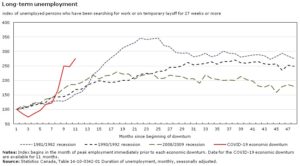COVID-19 causing more long-term unemployment than 2008 recession
The number of residents in Canada who are facing long-term unemployment saw a steep rise towards the end of 2020.
Being unemployed for 27 weeks is considered “long-term unemployment.” Canada saw an uptick in these numbers in September and October, 2020, following massive job losses in March and April when businesses closed to curb the spread of coronavirus.
After 8 months, the COVID-19 pandemic has had greater rates of long-term unemployment than the 2008 recession.

In December, the number of people in Canada who were unemployed long-term was 493,000— just under a third of all unemployed individuals.
Find out if you’re eligible for Canadian immigration
With the increasing COVID-19 cases over the winter period, tighter health restrictions such as stay-at-home orders, curfews and lockdowns were put in place in various provinces. As a consequence, Canada’s economic recovery slowed.
In December 2020, employment fell for the first time since April. By the end of 2020, the number of workers who were affected by the COVID-19 pandemic was at 1.1 million. This includes those who lost their jobs or saw their hours reduced.
How the COVID-19 pandemic affected businesses and individuals
As a result the pandemic's economic downturn, economic activity of businesses and individuals alike was impacted. Many individuals may have been deterred from spending like they used to prior to the pandemic. For businesses that were able to develop their digital capabilities, many employees transitioned to working from home. Businesses may have put their expansion or growth plans on hold due to increasing financial and economic uncertainty. The public’s economic activity changed as Canada adapted to the “new normal.”
Businesses’ operations were continuously disrupted due to openings and closures. Many of these businesses are still attempting to adjust to COVID-19 restrictions but are facing short-run turbulence and uncertainty due to frequent closures. This may also force the hand of some businesses to lay off some employees.
The Canadian Survey on Business Conditions highlighted the main stressors that are facing some businesses.
Among those who responded, 30 per cent were unable to predict how long they will continue at their current revenue levels. A further 6 per cent estimated that they would remain in operation for less than three months. Another 5 per cent suggested that they were considering closing up shop or filing bankruptcy.
Reason to stay positive: all Canadians to be vaccinated by September 2021
For the last couple of months, Canadian prime minister Justin Trudeau and the Canadian public health agency have insisted that all Canadians who want one will get a COVID-19 vaccine by September 2021.
With the Pfizer and Moderna COVID-19 vaccines alone, Canada expects to vaccinate 36 million Canadians by the end of September.
However, Health Canada are close to finalizing the review of the AstraZeneca COVID-19 vaccine candidate.
If successful, Canada may agree to receive vaccines from AstraZeneca, and may review their current projections.
Find out if you’re eligible for Canadian immigration
© CIC News All Rights Reserved. Visit CanadaVisa.com to discover your Canadian immigration options.
- Do you need Canadian immigration assistance? Contact the Contact Cohen Immigration Law firm by completing our form
- Send us your feedback or your non-legal assistance questions by emailing us at media@canadavisa.com







